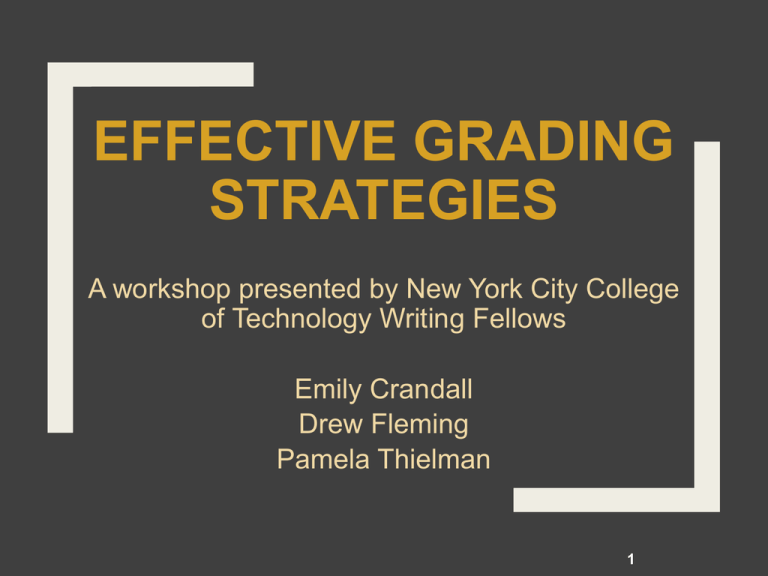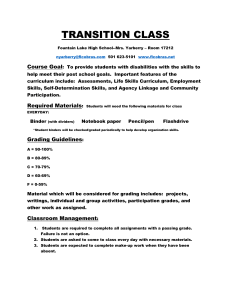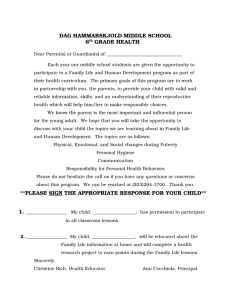PowerPoint - City Tech OpenLab
advertisement

EFFECTIVE GRADING STRATEGIES A workshop presented by New York City College of Technology Writing Fellows Emily Crandall Drew Fleming Pamela Thielman 1 Workshop Goals I. Advance Planning for the Grading Process II. Effective Grading and Minimal Marking 2 Activity Read the text provided on page one of your handout and mark it as you would your own students’ work. 3 4 Lower-Order Concerns Higher-Order Concerns Thesis statement Quality of argument/ideas Evidence used correctly Logic of conclusions Use of topic sentences Organization of paper Follows assignment? Demonstrates understanding of course material Grammar (agreement) Spelling Formatting (font, spacing) Citation Punctuation Sentence structure Vocabulary/word choice Style Myth “Students’ writing will improve in direct proportion to the amount of time their teachers spend on their papers.” (Hairston 2002) 5 Lay the Foundation Before you hand out assignment: Design effective assignments Establish clear grading criteria Rubrics After you hand out the assignment: Have a class discussion Meet with students (one-on-one or in groups) 6 Share the Workload Use Library Resources Atrium Learning Center http://www.citytech.cuny.edu/students/learningcenter/ ESL Writing Tutors in English Department Peer Review WAC Fellows 7 Build on WAC Principles Scaffolding Low stakes/high stakes assignments Assignment handouts Establish Clear Grading Criteria Rubrics 8 More Strategies for Grading Preparation Peer Review In class As homework Online 9 How do students perceive feedback? Coach vs. judge Encourage student autonomy Students at Bunker Hill Community College, Boston, MA 10 Instructor Feedback: General Themes “At least do no harm” Recognize that students interpret most feedback from instructors as criticism Be careful not to turn students into our adversaries Frame comments in a forward-looking way 11 Roles of Grading Evaluation Communication Motivation 12 13 Minimal Marking Supports students in improving their writing Gives students concrete ways to fix what has been marked Encourages student accountability for the quality of their writing Saves time! Strategies for Marking Low Stakes Assignments No marking Have a conversation Ask questions High Stakes Assignments Put the pen down! Selective line edits End comments Develop a Key 14 One Option: Develop a Key Incorrect word Upper case/lower case Incorrect sentence Join Insertion Provide more support Reversal Awkward phrasing Delete Redundancy Combine ideas for concision Yes! Well Said New Paragraph 15 Supportive Responding Ask questions Use any color ink or pencil…except red Write in legible and complete sentences Vary and prioritize feedback 16 17 Supportive Responding (excerpted from K. Walk) Types of Feedback Supportive Feedback “You’ve done a great job at finding facts and quotes to support your argument” “You have included facts that support your argument” Revision-Oriented Feedback “Your supporting arguments need some development, but your thesis statement is clear and strong.” Informational Feedback “Most states do allow a waiting period before an adoption is final—Do you feel that all such laws are wrong?” Technical Feedback “Your use of verb tenses is often confused. Please review paragraphs 1 and 2 on page 4 where those errors were corrected for you.” 18 Group Grading Exercise 19 Conclusion Plan ahead Use resources Mark minimally and supportively 20 References Bean, John C. Engaging Ideas. 2nd edition. San Francisco: Jossey-Bass, 2011. Elbow, Peter. “High Stakes and Low Stakes in Assigning and Responding to Writing.” In Writing to Learn: Strategies for Assigning and Responding to Writing in the Disciplines, ed. Mary Deane Sorcinelli and Peter Elbow. San Francisco: Jossey-Bass, 1997. Harris, Muriel. “The Overgraded Paper: Another Case of More is Less.” In How to Handle the Paper Load, ed. Gene Stanford, 91-94. Urbana, IL: National Council of Teachers of English, 1979. Walk, Kerry. “Teaching with Writing: A Guide for Faculty and Graduate Students.” Princeton Writing Program: 30-40. 21 Next time on WAC... The Creative Classroom December 10, 2015 1pm-2:15pm Namm 1005 Please review chapter 7 and skim chapters 8-11 in Engaging Ideas (Bean) 22




